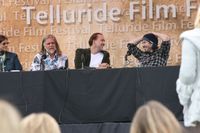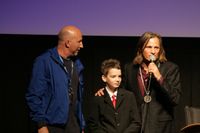14 Sep 36th annual Telluride Film Festival: Review

Anne Thompson, George
Gittoes, Nicholas Cage,
and Jason Reitman
at Labor Day seminar
The Telluride Film Festival invented downsizing: for 36 years, the directors of the event have selected just 20 – 30 movies from among the hundreds submitted to them each year, which explains why the celluloid celebration appeals to discriminating cinephiles. Elitist? Unapologetically. This year as every year, the Telluride Film Festival shunned the usual suspects, going out on a limb to inspire and educate.
The Telluride Film Festival is also about making connections. Over the long Labor Day weekend, the tail end of moviedom's so-called popcorn season (Memorial Day – Labor Day), actors, directors, cinematographers, producers, distributers, and buffs chat like long lost friends on Main Street, the Gondola, and in lines, about what gladdened, saddened and maddened.
Makes sense Jason Reitman's latest comedic triumph, "Up in the Air," should have had its world premiere in Telluride, the town that established the Oscar buzz for his "Juno." "Up in the Air" is, after all, about downsizing and making connections. Would lightning strike twice?
in "Up in the Air," George Clooney is at his insouciant best as the corporate hatchet man on the verge of reaching his goal of 10 million frequent flyer miles. Then he meets trouble in the form of Alex, a smart, sexy Vera Farmiga, a frequent flying femme fatale. Beneath the brisk satire is Reitman's richly nuanced meditation on modern loneliness: nowadays, in some way, we are all "Up in the Air."
Before Telluride Film Festival co-director Gary Meyer spilled the beans about the 2009 line-up, I wondered out loud if he and co-director Tom Luddy would succumb to the lure of the pop contagion de jour: vampires. Would they stick out their necks for a film like "Thirst," which had bagged a jury prize at Cannes, one of their favorite hunting grounds? Predictably, the Telluride Film Festival bucked the prevailing trend. In Telluride at least, Bill Compton did not get to become the new Brad Pitt. However, since the economic downturn hit warp speed last September, predators have infiltrated the zeitgeist: The appearance of beasts of prey in whatever form – and they are shape shifters – on the silver screen is inevitable.
Turns out Alex in "Up in the Air" is a predator. (Not saying why because the truth would spoil the film's surprise ending.)

Q & A with John Hillcoat,
Kodi Smit-McPhee
and Viggo Mortensen
There's war and very little peace in "The Last Station," a film by director/writer Michael Hoffman in an another Telluride Fiilm Festival world premiere. "The Last Station" is based on a book by Jay Parini about the last days of Count Leo Tolstoy, the writer who became a fervent Christian anarchist and pacifist, turning his back on the privilege and opulence into which he was born. Christopher Plummer is Tolstoy and Helen Mirren is his wife Sofya, going at it like Kate and Petruchio, even after 48 years of marriage. James McAvoy is Tolstoy's devoted secretary Valentin Bulgakov. Paul Giamatti is a sleazoid zealot, Vladimir Chertkov, the leader of the utopian movement Tolstoy founded. The predator? Depends on whose side you are on, Sofya's or Chertkov's. With a relatively limited number of movies to choose from and now 10, not five, films with a shot at Best Picture, "The Last Station" could get the nod. For sure, Mirren, Plummer and McAvoy are contenders.
Peter Sarsgaard's character, David, in "An Education": a predator with a Lolita fixation. This period film, set in 1960s London, tells the story of Jenny, a super smart 16-year-old headed for Oxford – or trouble. Jenny is Carey Mulligan, a 22-year-old British actress in a break-out performance reminiscent of Emma Watson in "Breaking the Waves," Audrey Tatou in "Amelie" and Audrey Hepburn, to whom the actress bears more than a passing resemblance, in just about anything. "An Education" is based on Observer journalist Lynn Barber's real-life experience. Could the film be this year's "Slumdog Millionaire?" Early buzz says good chance. Regardless, based on Sundance, Berlin, and now Telluride, there's an Oscar in Carey's future.
We never see the predators in director Rachid Boucareb's film about the 2005 London bombings, but terrorists trigger the story that unfolds in "London River." When we first meet, Elisabeth – Brenda Blethyn, once again disappearing into her character – she is a widow living on the Channel Island of Guernsey, heading to church to hear a sermon about loving thy neighbor. Ousmane is an African forester. Played by the equally believable, majestic Sotigui Kouyate, he is first seen praying toward Mecca in an olive grove. The two, thrown together by circumstances and fate, make improbable bedfellows. Bravura performances in this small story with a big heart and its focus on human dignity guarantee long legs and an international audience. An Oscar nod for these two character actors? Yes, in the best of all possible worlds.
In a preview of his Telluride Film Festival, Gary Meyer told me he and Tom Luddy gave up their beauty sleep to watch the "Red Riding" trilogy back to back. The crime drama was that good.
The "Red Riding" films were the very last movies we saw over the weekend and, like Meyer and Luddy, we too became spellbound: the urge to tie all the loose threads together, which happens in "1983," is irresistible. Even the scores conspire in the seduction: the work of three different composers, echo each other – and the truth. Performances across the board are spectacular. No doubt about it, "Red Riding," the no-holds-barred work of directors Julian Jarrold, "1974," James Marsh, "1980" and Anand Tucker, "1983, " heads the list of cinematic highlights of the year. Adapted from novels by David Peace, set in the Yorkshire region of Northern England, the stories put police corruption under a magnifying glass, exposing the darkest corners of human nature in the context of the terrifying Yorkshire Ripper campaign. As an epic achievement, "Red Riding" is just as darkly powerful, but more nuanced than "The Godfather," its bogeymen hidden in plain sight. Run, don't walk, to your local theatre when IFC releases the series later this year.
"Pervs" of of all stripes, and their victims, undead and alive, parade through Todd Solodnz's quirky "Life During Wartime," a moral wilderness that reveals little but the intricate treacheries of the human heart. The film, a meditation of forgiveness and forgetting, is about all the ugly little secrets people hide behind the faces they show the world. Performances across the board in this kaleidoscopic story are uniformly good – flawed characters flawlessly rendered – but Charlotte Rampling's star turn as a lonely, outspoken woman looking for love in all the wrong places, is, on its own merits, worth the price of admission. The most compelling, heart-breaking character in the ensemble cast is a boy, Timmy, Dylan Riley Snyder as Trish's (Allison Janney) second son, about to have a bar mitzvah and become a man, terrified of becoming a "faggot" (read pedophile) like his psychiatrist dad. "Life During Wartime" is just as unforgiving, confrontational and visually compelling as Solondz's previous work. (The movie is a sorta sequel to "Happiness.) His cult following will flock, but the film is unlikely to be the breakout, mainstream success the director is maybe yes, maybe no, seeking, because of the ick factor.
Hannah Rothschild's directorial debut is a fine documentary quite literally about black and white issues surrounding the writer/dirctor's great aunt Pannonica de Koenigswarter, the "Jazz Baroness" and her relationship with jazz genius Thelonious Monk. Telluride audiences could not resist the chance to peek through the window into the life of this modern-day Siren and black sheep of one of Europe's most influential banking families. Don't miss the chance to crash the gates in November, when the "Jazz Baroness" airs on HBO.
We never got around to seeing "Vincere," "Farewell," "The Prophet," and "White Ribbon," but the buzz surrounding all four was positive. Audrey Tatou got a big thumbs up for her portrayal of Coco Chanel in "Coco Before Chanel." Raves for the French landscape too. The film itself, not so much. Reviews on "The Bad Lieutenant" were mixed, though generally good. The shock and gore fest, "Paranormal Activity," generated a great deal of excitement in the Twitterverse. More than one chatty cineaste described "Bright Star," the film about the love affair between the poet John Keats and his neighbor, the seamstress Fanny Brawne, as "like watching grass grow." but, as the saying goes, one man's meat…. The crowd also liked the panel discussions and "Conversations." The Labor Day seminar was moderated by Anne Thompson, and included Nicholas Cage, George Gittoes, Jason Reitman, and Paul Schneider.
Overall, a rich banquet, one of best Telluride Film Festivals ever, thanks to the directors, who somehow managed to find that elusive sweet spot among great storytelling, superb filmmaking, stars with depth, and escapist entertainment. The 36th annual Telluride Film Festival was an event with teeth – but no fangs.


Sorry, the comment form is closed at this time.